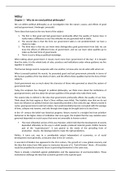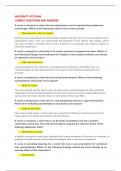Miller
Chapter 1 – Why do we need political philosophy?
We can define political philosophy as an investigation into the nature, causes, and effects of good
and bad government. (Ambrogio Lorenzetti)
Three ideas that stand at the very heart of the subject
1. The first is that good and bad government profoundly affect the quality of human lives: it
really makes a difference to our lives whether we are governed well or badly.
2. The second idea is that the form our government takes is not predetermined: we have a
choice to make.
3. The third idea is that we can know what distinguishes good government from bad: we can
trace the effects of different forms of government, and we can learn what qualities go to
make up the best form of government.
There is such a thing as political knowledge.
When talking about government, it means much more than ‘government of the day’. It is broader
than the state; it is the whole body of rules, practices and institutions under whose guidance we live
together in societies.
That human beings need to cooperate with one another, to know who can do what with whom etc.
When Lorenzetti painted his murals, he presented good and bad government primarily in terms of
the human qualities of the two kinds of rulers, and the effects those qualities had on the lives of their
subjects.
Good government was as much about the character of those who governed as about the system of
government itself.
Today the emphasis has changed: In political philosophy, we think more about the institutions of
good government, and less about the person qualities of the people who make them work.
The easiest idea to defend is the idea that government profoundly affects the quality of our lives.
Think about the Nazi regime or Mao’s China: millions were killed. The fatalistic view that we do not
have any influence on political choices was especially prevalent a few centuries ago. History moved in
cycles: good government could not endure, but would inevitably become corrupted with the passage
of time, collapse into tyranny, and only through slow stages be brought back to its best form.
In the 19 century the belief was historical progress: history moved in a straight line from primitive
th
barbarism to the higher states of civilization. But once again, this implied that the way societies were
governed depended on social causes that were not amenable to human control.
The most influential version of this was Marxism, which held that the development of society
depended ultimately on the way in which people produced material goods. Politics became
part of the “superstructure”: it was geared to the needs of the prevailing form of
production. Clearly, the ideology failed to make the right predictions.
Politics, it turns out, was to a considerable extent independent of economics, or of social
development more generally, as became clear in the 20 century.
th
A new kind of fatalism has appeared in the 21st century. The growth of a new global economy and
the idea that states have little space to maneuver because of it. ‘End-of-history’ thesis : All societies
would be propelled by economic forces is governing themselves in the same way.
There is already a backlash against globalization and the appearance of environmentalism. These
movements challenge the idea that economic growth is the supreme goal.
, Miller has argued that political philosophy deals with issues that are of vital importance to all of us,
and furthermore issues over which we have real political choices to make.
Politics is about the use of power, and powerful people do not pay any attention to the works of
political philosophy. It is true that when political philosophers have tried to intervene directly in
political life, they have usually come unstuck.
Political philosopher Thomas Hobbes for example, believed in absolute government: we should
submit to any effective government, no matter what its credentials were.
The example of Hobbes can help to explain why political philosophers have so rarely made a direct
impact on political events. Because they look at politics from a philosophical perspective. They
challenge existing believes. This does not stop political philosophy from having an influence,
sometimes a considerable influence, with the passage of time.
Shifts in politics take place when philosophers corresponds to political and social change in such a
way that the changes become commonplaces for the new generation.
Political philosophy claims that it can bring us to a kind of truth about politics, something different
from the opinions that guide us from day to day.
Plato was the father of this philosophy; he claims that from the position of the philosopher: he has
knowledge while those around him have only distorted opinions, but the path to philosophical
knowledge is hard, few are willing to take it (Contrast between knowledge and common opinion).
A more modern few on this philosophy is that political philosophy works more critically and
systematically. They take less for granted. Are claims supported by evidence? Does their claims fit
into the big picture? Is economic growth always a good thing? Etc.
Political philosophers will also ask about how the different goals of politicians are related. Politicians
often concede that they have to make sacrifices, but they rarely do.
Political philosophy can never give us universal truth as society and government changes, although
some items have stayed on as far back as our records go.
Chapter 2. Political authority
- We are governed by states that wield unprecedented power to influence our lives. They
provide basic protection, and supply us with huge range of benefits.
- This is a modern phenomenon, as history shows that humans were governed on a smaller
scale.
- Political authority has two sides: it means that people must recognize it as authority which
means they have a right to command them to behave in a certain way. On the other hand,
people who disobey are threatened by sanctions.
- Political authority imposes unwelcome requirements on use (taxes). This gives rise to the
anarchist argument, that societies can govern themselves perfectly without political
authority.
- Political philosophers justify the existence of authority by asking what would happen if it was
present (without army, police etc.).
- Thomas Hobbes (Leviathan): he made the argument that cooperation between people is
impossible in the absent of trust, and that trust will be lacking where there is no superior
power to enforce the law. A climate of fear would follow the breakdown of authority; the
kinder, more trusting side of humanity would be lost.
Chapter 1 – Why do we need political philosophy?
We can define political philosophy as an investigation into the nature, causes, and effects of good
and bad government. (Ambrogio Lorenzetti)
Three ideas that stand at the very heart of the subject
1. The first is that good and bad government profoundly affect the quality of human lives: it
really makes a difference to our lives whether we are governed well or badly.
2. The second idea is that the form our government takes is not predetermined: we have a
choice to make.
3. The third idea is that we can know what distinguishes good government from bad: we can
trace the effects of different forms of government, and we can learn what qualities go to
make up the best form of government.
There is such a thing as political knowledge.
When talking about government, it means much more than ‘government of the day’. It is broader
than the state; it is the whole body of rules, practices and institutions under whose guidance we live
together in societies.
That human beings need to cooperate with one another, to know who can do what with whom etc.
When Lorenzetti painted his murals, he presented good and bad government primarily in terms of
the human qualities of the two kinds of rulers, and the effects those qualities had on the lives of their
subjects.
Good government was as much about the character of those who governed as about the system of
government itself.
Today the emphasis has changed: In political philosophy, we think more about the institutions of
good government, and less about the person qualities of the people who make them work.
The easiest idea to defend is the idea that government profoundly affects the quality of our lives.
Think about the Nazi regime or Mao’s China: millions were killed. The fatalistic view that we do not
have any influence on political choices was especially prevalent a few centuries ago. History moved in
cycles: good government could not endure, but would inevitably become corrupted with the passage
of time, collapse into tyranny, and only through slow stages be brought back to its best form.
In the 19 century the belief was historical progress: history moved in a straight line from primitive
th
barbarism to the higher states of civilization. But once again, this implied that the way societies were
governed depended on social causes that were not amenable to human control.
The most influential version of this was Marxism, which held that the development of society
depended ultimately on the way in which people produced material goods. Politics became
part of the “superstructure”: it was geared to the needs of the prevailing form of
production. Clearly, the ideology failed to make the right predictions.
Politics, it turns out, was to a considerable extent independent of economics, or of social
development more generally, as became clear in the 20 century.
th
A new kind of fatalism has appeared in the 21st century. The growth of a new global economy and
the idea that states have little space to maneuver because of it. ‘End-of-history’ thesis : All societies
would be propelled by economic forces is governing themselves in the same way.
There is already a backlash against globalization and the appearance of environmentalism. These
movements challenge the idea that economic growth is the supreme goal.
, Miller has argued that political philosophy deals with issues that are of vital importance to all of us,
and furthermore issues over which we have real political choices to make.
Politics is about the use of power, and powerful people do not pay any attention to the works of
political philosophy. It is true that when political philosophers have tried to intervene directly in
political life, they have usually come unstuck.
Political philosopher Thomas Hobbes for example, believed in absolute government: we should
submit to any effective government, no matter what its credentials were.
The example of Hobbes can help to explain why political philosophers have so rarely made a direct
impact on political events. Because they look at politics from a philosophical perspective. They
challenge existing believes. This does not stop political philosophy from having an influence,
sometimes a considerable influence, with the passage of time.
Shifts in politics take place when philosophers corresponds to political and social change in such a
way that the changes become commonplaces for the new generation.
Political philosophy claims that it can bring us to a kind of truth about politics, something different
from the opinions that guide us from day to day.
Plato was the father of this philosophy; he claims that from the position of the philosopher: he has
knowledge while those around him have only distorted opinions, but the path to philosophical
knowledge is hard, few are willing to take it (Contrast between knowledge and common opinion).
A more modern few on this philosophy is that political philosophy works more critically and
systematically. They take less for granted. Are claims supported by evidence? Does their claims fit
into the big picture? Is economic growth always a good thing? Etc.
Political philosophers will also ask about how the different goals of politicians are related. Politicians
often concede that they have to make sacrifices, but they rarely do.
Political philosophy can never give us universal truth as society and government changes, although
some items have stayed on as far back as our records go.
Chapter 2. Political authority
- We are governed by states that wield unprecedented power to influence our lives. They
provide basic protection, and supply us with huge range of benefits.
- This is a modern phenomenon, as history shows that humans were governed on a smaller
scale.
- Political authority has two sides: it means that people must recognize it as authority which
means they have a right to command them to behave in a certain way. On the other hand,
people who disobey are threatened by sanctions.
- Political authority imposes unwelcome requirements on use (taxes). This gives rise to the
anarchist argument, that societies can govern themselves perfectly without political
authority.
- Political philosophers justify the existence of authority by asking what would happen if it was
present (without army, police etc.).
- Thomas Hobbes (Leviathan): he made the argument that cooperation between people is
impossible in the absent of trust, and that trust will be lacking where there is no superior
power to enforce the law. A climate of fear would follow the breakdown of authority; the
kinder, more trusting side of humanity would be lost.













